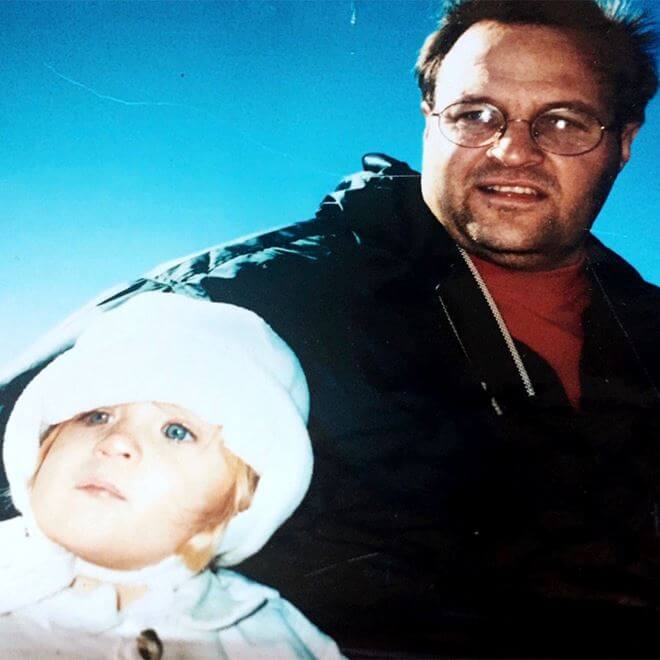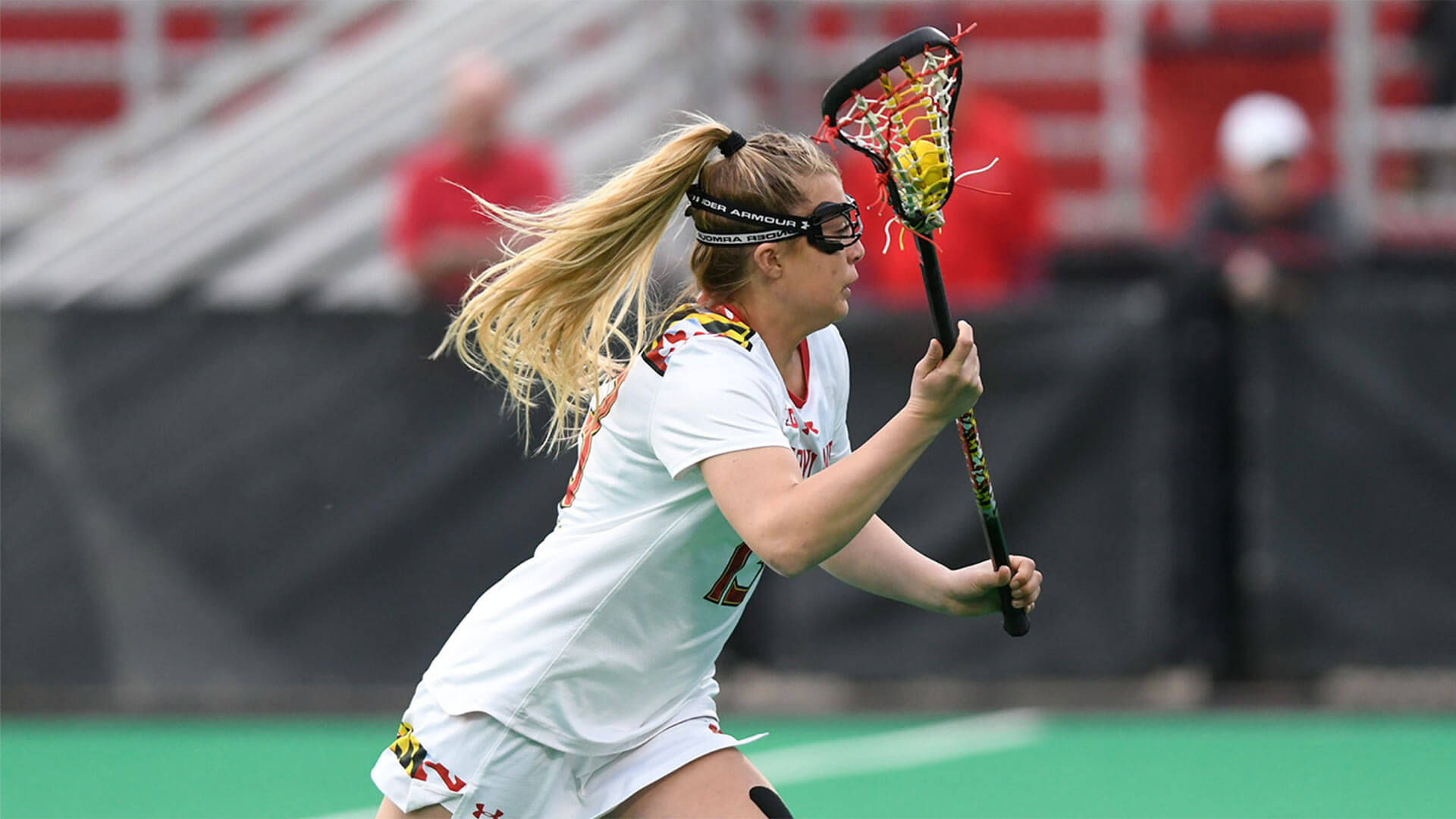- May 15, 2020
- By Nikki Sliwak ’20
To all the girls and boys who need to hear this, it’s okay to not be okay. It’s okay to have a bad day. It’s okay to feel like doing nothing every once in a while. It’s okay to feel like you need to cry. It’s okay to need to step away and take a break from your sport. It is okay.
My name is Nikki Sliwak, and I am a senior on the women’s lacrosse team. I am a student-athlete who suffers from depression and anxiety. And that is okay. Most people would not know that about me, and that’s the point. Everyone has a story to tell behind their smiles. Here is mine.
My story starts when I was three years old. I lost my dad on 9/11. I don’t remember the day, the weeks, the months or the years to follow that tragic day. Most of all, I don’t remember my dad. Apparently, he was this amazing, kindhearted, sweet guy who made everyone smile. I so badly wish I got to witness that.
 As I grew older, I found a connection to my dad through sports. He was a great athlete who played baseball and football in high school and went on to play football in college. I channeled my sadness and anger on the soccer field, the lacrosse field and the basketball court. I wore his number 34 in honor of him. It pushed me to want to be the best, almost to a place of perfection. In between the white lines, nothing was stopping me from making him proud.
As I grew older, I found a connection to my dad through sports. He was a great athlete who played baseball and football in high school and went on to play football in college. I channeled my sadness and anger on the soccer field, the lacrosse field and the basketball court. I wore his number 34 in honor of him. It pushed me to want to be the best, almost to a place of perfection. In between the white lines, nothing was stopping me from making him proud.
My battle with depression started in late middle school/early high school. I had lost many of my friends to middle school drama and went into high school feeling alone. I was really starting to process the death of my dad and was sad a lot of the time. Traumatic events in life can really mess with you, and I developed PTSD from my loss.
I saw these dads standing on the fence before games; I so badly wished my dad was standing there with them. I became obsessive about working out. I would run miles after practice and then still go to a CrossFit class. It was the only thing that made me feel good. It was the only place where I didn’t have to think about anything—I just had to listen to music and put hard work in.
On top of working out obsessively, in 10th grade I developed an eating disorder. Yes, I was an athlete who developed an eating disorder. My life felt like it was out of my control. I felt like nothing was going my way, and I couldn’t control a single thing. I could however control what I ate and when I ate, so I did. I dropped to under 100 pounds. I lost muscle and speed that helped me on the field. My mom and I argued daily about food. I turned into a different person.
My friends had to report back to my mom with all the things I ate that day so she could force me to make up the calories when I got home. It was a very vicious cycle that I was putting myself and my family through. I slowly started to change when my performance was at its lowest.
On top of all that, even sports became difficult for me to play. I had coaches who really disliked me because they saw my drive to be perfect and make my dad proud as rude and selfish. They saw me as hard to coach because I didn’t settle for average. I wasn’t easygoing like the rest of my teammates; I was very hard on myself. They thought I only cared about myself and not the team.
I felt like they didn’t appreciate my drive enough and I felt disrespected by most of them. All I wanted was to know that if my dad was here, he would tell me how proud he was of me and the team. My depression made me internalize everything. What I was feeling on the inside and what people saw on the outside were two completely different things.
 Finally, by senior year I was on a high, playing my best and doing my best in school, excited for my next chapter: playing lacrosse at Maryland.
Finally, by senior year I was on a high, playing my best and doing my best in school, excited for my next chapter: playing lacrosse at Maryland.
I love everything about the University of Maryland. My lacrosse team is everything to me. I am truly thankful for the lifelong friends I made there. All that being said, it hasn’t been an easy ride.
College is where my depression also turned into anxiety. The lacrosse aspect did not go exactly as I hoped and dreamed. I went from being one of the top-ranked players coming out of Long Island to sitting on the bench. Never in a million years did I see myself as one of those players who did not play when they got to college. That made me feel like I had lost the connection I had with my dad because I wasn’t in between the white lines anymore.
From dealing with not playing, to new college classes, assignments, meeting all new people and being away from my mom and family, I fell into a deep depression. I developed anxiety and started to worry about everything little thing. Anxiety crept into every aspect of my life without a single person knowing what I was dealing with. Once again, I began to internalize everything.
I could not sleep. There were nights I was up until 4 a.m. There were nights I was up all night. I would think about every decision, every step, every shot I took at practice, every word I said in a conversation. The anxiety got to a point where I was having panic attacks and could not control them. Some nights I had to leave where I was and go home because I couldn’t get them under control. It became so bad that I started to make myself throw up. The anxiety was so bad that I needed a way to release it. That feeling of hopelessness and frailness was what I felt when I made myself vomit, so I wanted to reinforce that feeling. This was my lowest of lows.
It became so low because I had let my mind take over my entire world. I thought about every single detail that was going on in my life at that time. I didn’t have a way to cope with what was really going on. I became so overwhelmed with who I was, with my thoughts, with my life.
At the end of my sophomore year, I decided to go on an antidepressant. Why did it take me so long? I thought that if I gave into the medicine, the monster in my head won. I did not want that feeling of that thing inside my head winning. I did not want to have to let people know I was on medication for depression and anxiety. I did not want the medication to determine my happiness.
But in reality, I couldn’t control my happiness on my own. I needed something to kick-start me into gear. The medication allowed me to put my depression and anxiety to the side and focus on me first, something I was not able to do for years. I was able to control the thoughts I was feeding myself.
 Slowly but surely I made a commitment to myself to get better each and every day. I started to change my mindset and find ways to release the anxiety. I did not let myself spiral into deep depression like before. I started to change what I was telling myself. I started to find the things I could control in my life, and let the universe take care of what I could not control. I could control the effort I put in, how hard I worked, what kind of teammate I was and what kind of daughter and friend I wanted to be. I started to open up to the people I loved around me, and lean on them rather than isolate myself. The thing is, it’s a process. It does not happen overnight. It is something that takes time and patience with yourself.
Slowly but surely I made a commitment to myself to get better each and every day. I started to change my mindset and find ways to release the anxiety. I did not let myself spiral into deep depression like before. I started to change what I was telling myself. I started to find the things I could control in my life, and let the universe take care of what I could not control. I could control the effort I put in, how hard I worked, what kind of teammate I was and what kind of daughter and friend I wanted to be. I started to open up to the people I loved around me, and lean on them rather than isolate myself. The thing is, it’s a process. It does not happen overnight. It is something that takes time and patience with yourself.
Going into my senior year, I did the one thing that I never did before: I trained my mind. It is the biggest muscle that most athletes forget about. The mind is what controls your movement and your ability. I decided to focus all my training on that.
I did not write all of this for your pity and sympathy. Yes, I know I’ve been through it all, I hit some struggles many athletes face, but this wasn’t just to list all of my problems. I share my story and my experience because I want you to know that you are not alone. If you are having a bad day, I hope this picks you up and gives you hope that you will get through it. If you are having a bad month, please know that it will not last forever. Maybe this just wasn’t your year. Find your strength from within and make it your year.
There are plenty of athletes struggling with mental illness. Mental illness is not something to be scared of, but something to embrace. I have learned that to be a successful athlete, you cannot compete at your highest level if your mental health and mind are not taken care of first. You as a human is the most important thing to being an athlete.
I have also learned that you cannot judge your self-worth on your sport. If you judge your self-worth on how well you played or how good you are as an athlete, you will not get very far. Sports should not define you as a person; rather sports should be a place to help shape you as the person you want to be. Dealing with depression and anxiety does not make you weak. Asking for help does not make you weak. I have learned that mental illness as an athlete adds an extra obstacle to training, but that is an obstacle I am willing to compete against to work and overcome each day.
With all that is going on in the world today, the mental health of many is probably real low. It’s okay. I feel it too. I am with you. We are in this together. We will get through it together. Establish a routine. Work out in some form every day to release your endorphins. Eat healthy to feel good. Always save room for dessert. Talk to or Facetime someone new each day. Stay in contact with the ones you love. Practice your sport, because when this is over, it is go time. Enjoy time with your family and connect with them like you may not have before. Pick up a new hobby. Try something that you never have.
It’s a time to take a deep breath from the nonstop life that athletes live. You may never have another chance to just focus on you and only you ever again. Know that this is not permanent and that it will all be okay. Remember to tell the important people in your life how much you love them daily. You will get through this with the help of the people you surround yourself with. Focus on what you get to do, not what you can’t do. Before you know it, life will go back to normal. I promise, we are in this together.
P.S: I want to thank my amazing mother for being the most incredible person. My mom has been there every step of the way through my journey. She has been the most supportive, caring and loving human being one can be. She has been there to talk to me through my lowest of lows and cheer me on through my highest of highs. She has been my biggest cheerleader, best friend and therapist when I need it. I would not be where I am today without her, and I am so thankful to have such a strong and fierce role model in my life.
Topics
Athletics